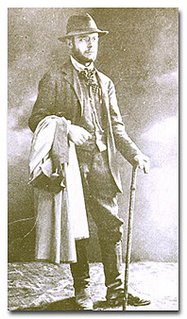
Here's a picture of me getting ready for a tramp in the woods.
No, actually, (as if I really fooled you), this is Bela Bartok getting ready for one of his groudbreaking forays into the Transylvanian countryside to collect folk music. Bartok was one of the first musicians to systematically collect, study and categorize folk music. What he heard and learned during his trips across the countryside of what used to be just Hungary and is now also Roumania and Czechoslovakia had a profound affect on the music he composed and on his thinking as a human being.
But I'm not really intending to write another biography of Bartok, as much as I think he led a fascinating life. I've been listening to a lot of his music lately, and in particular his string quartets, which are often (and justly) referred to as the 'new testament', the old testament being the quartets of Beethoven. I would like to urge anybody and everybody to give these a listen - get them out of the library if you don't already have them - especially the Fifth quartet, which is my personal favorite.
I've been trying to come up with a concise, intelligent way to describe this quartet and why I like it so much, but have been mostly failing to find the right words. It is a gentler and more austere quartet than the fourth, which may be his most well-known, but it is still full of the spiky character and strong dissonances that inhabit most of Bartok's work. Bartok himself could be spiky and dissonant by most accounts, but he was also a fierce idealist and compassionate humanist, a proud Hungarian yet universalist in his outlook, and these qualities also show in every measure of his music, and never more than in this piece. On a more specific note, if you listen to this quartet, note the five-movement structure of the piece, the affinities of the first movement for the last and the second for the fourth (the fourth movement is essentially a free variation of the second). Bartok never subscribed to any established system of composing but came up with plenty of his own.
Next stop, Bluebeard's Castle!
No comments:
Post a Comment